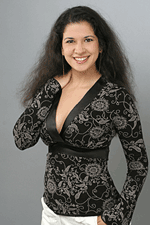> [Archived] Interviews

An Interview with the Soprano Laura Tătulescu
Laura
Tătulescu, last night you gave a recital, accompanied by a
trio. We are much more used to listening to lyrical artists being
accompanied by the piano; this combination of timbres that you
proposed in Munich yesterday is original. How was the idea of this
collaboration born?
Adrian Lazăr approached me and asked me whether I would like to take part in this project, which I found very interesting. At first, we wanted to perform lieder by Enescu and other Romanian composers, but unfortunately there were no materials for the trio-with-vocals arrangement. So, we proposed instead lieder by Haydn and Beethoven for trio and vocals, a very interesting work by a German composer, Boris Blacher, for violin and soprano (a very beautiful and poignant work) and six lieder by Hugo Wolf for soprano and piano. The trio also played Smetana and a work by Henze. We chose this repertory together.
The venue
chosen for the recital was a church – ‘Allerheiligen’ Hofkirche
in Munich. Does this place hold a special significance for you, for
your stage partners?
I performed there before: just last month I had a tango concert and I sang Astor Piazzolla, also with a trio, but another one, an exceptional trio that plays very different music genres, tango included. That collaboration broke new ground for me, it was another music genre and I liked it very much. Returning to your question: Hofkirche is part of the Residenz Theater, which also includes Cuvilliés-Theatre. It’s actually a former church turned into a concert hall. It’s not very big: if I’m not mistaken, it has around 400 seats. I was happy to see that the hall was packed yesterday. The concert took place in the morning, at 11:00. I was all the more glad for the packed house, as this doesn’t happen very often at that hour.
How would you
describe your collaboration with this trio – and with the trio
arrangement, in general – compared to the ordinary type of
accompaniment, that of the piano?
It’s more difficult. First of all, because there’s four of us, not just two. I would like to mention that we have been rehearsing for this concert since the end of the previous season. At the end of April I left for Glyndebourne for three months. We knew about this concert and we had to rehearse beforehand. Together with the pianist, we gradually ‘deciphered’ the score and we focused on certain details. Then the season began, the violinist also came and the three of us rehearsed, working again on details, on the sound and the text. At a certain point, rather late, the cellist, Jakob, also came and then the formula was complete. Therefore, work was done by degrees. Getting the programme ready ahead of time was a luxury. We don’t always have enough time.
…and the
result justified all this preparation.
I’d like to think that’s true. Even if sometimes – or so they say – during the performance you give 80% of what you managed during the rehearsal and this is already a high percent. I’d like to believe that yesterday was one of the good days.
What
is on your agenda for the following months?
Next on the agenda is my debut at Gewandhaus in Leipzig under the baton of maestro James Gaffigan with two works by Debussy, which are rather seldom performed: Le Martyre de Saint Sébastien for choir, soprano, orchestra and reciter, and La demoiselle élue for soprano, mezzo-soprano and orchestra. Then, I’ll sing La Bohème here, in Munich, beside three Romanians; this is something I’m really happy about. After that, I’ll make my debut in Santa Fe, America – it’s a double debut, of both opera house and role (Norina). It’s a new production with Don Pasquale, directed by Laurent Pelly (I enjoy his direction very much) and conducted by maestro Corrado Rovaris.
Thank
you for the interview and good luck with your future projects!
Translated by Mihaela Olinescu and Elena Daniela Radu
MTTLC, The University of Bucharest














